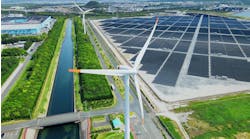The U.S. Department of Energy (DOE) on April 12 announced a Request for Information (RFI) to collect feedback from stakeholders to inform the implementation of $225 million in funding for improved building codes as part of President Biden’s Bipartisan Infrastructure Law.
The $225 million in funding will assist state agencies and partners as they improve the energy efficiency of America’s building stock through code upgrades to ensure more efficient and resilient buildings. According to a statement from the agency, reducing emissions from residential and commercial buildings is crucial to DOE’s strategy for achieving President Biden’s goal of a 100% clean electrical grid by 2035 and net-zero carbon emissions by 2050.
“Slashing building emissions is an absolute ‘must-do’ on the path to beating the climate crisis,” said U.S. Secretary of Energy Jennifer M. Granholm. “We're seeking public feedback on how to optimize every step of the building code adoption process, from education to implementation, to lower energy bills and create cleaner and healthier communities for every American.”
DOE notes that modern building energy codes are critical to lowering energy bills for homes and businesses, reducing greenhouse gas emissions, enhancing long-term resilience, and collectively ensuring the health, safety, and long-term efficiency of buildings. According to a press release, components of the new program's design will include code education and training, compliance research, planning to support code implementation, addressing needs in rural vs. urban areas, and other efforts to significantly support state and local code implementation.
DOE research suggests that modern building energy codes, combined with innovative approaches, such as stretch codes, building performance standards, and adjacent policies supporting advanced energy and climate goals, can yield upwards of $138 billion in energy cost savings and 900 million metric tons of avoided CO2 emissions.
Section 40511 of the Bipartisan Infrastructure Law provides additional funding to build on a long history of the U.S. DOE Building Energy Codes Program providing research and analysis, direct technical assistance, and competitive funding opportunities to support the development, adoption, and implementation of building energy codes at the national, state and local level.
DOE notes that building energy codes work in concert with other code provisions like fire, mechanical, and plumbing, and establish minimum acceptable energy efficiency standards for residential and commercial buildings. The new funding will also support increased compliance with energy codes in the form of workforce development in advanced technologies, construction practices, and sustained building science.
DOE emphasized that building energy code compliance and enforcement is critical to ensuring that the energy efficiency, cost savings, health, and resilience benefits associated with updated codes reach consumers. The agency said that findings from a series of pilot residential energy code compliance field studies demonstrated that potential lost savings from non-compliance was high ($18 million annually) and targeted education and training programs are effective at improving compliance rates and thereby reducing energy, costs, and emissions.
"Thoughtful and informed public responses to this RFI will help DOE design programs to achieve the goals and priorities established under the Bipartisan Infrastructure Law," concluded the agency's statement.
The deadline to submit responses to the RFI is May 20, 2022, at 5 p.m. ET. DOE especially encourages states, partnerships, alliances, and associations to respond, as specified under the Act, although all public responses will be heard and considered.


